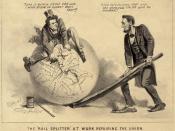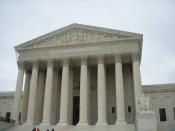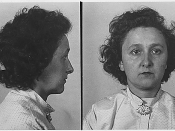�PAGE � �PAGE �1� Treason, Terrorism
Treason, Terrorism and Wartime Criminal Justice
Name
Class
Instructor
Date�
Treason, Terrorism, and Wartime Criminal Justice
In the history of the United States the acts of treason, terrorism and criminal justice during times of war have taken on various forms. From the Sedition Act of 1798 to the current war on terror, the Constitution and its amendments have been challenged to ensure national security. To understand this we must first look at what treason and terrorism are and the effects they have had in the reduction of civil liberties during times of war.
Treason
Treason is defined as: "The betrayal of one's own country by waging war against it or by consciously or purposely acting to aid its enemies." (Wehl, 1950)
Under Article III, Section 3, of the Constitution, any person who levies war against the United States or adheres to its enemies by giving them "aid and comfort" has committed treason within the meaning of the Constitution.
The term aid and comfort refers to any act that manifests a betrayal of allegiance to the United States, such as furnishing enemies with arms, troops, transportation, shelter, or classified information. If a subversive act has any tendency to weaken the power of the United States to attack or resist its enemies, aid and comfort has been given.
The Treason Clause applies only to disloyal acts committed during times of war. Acts of disloyalty during peacetime are not considered treasonous under the Constitution. Nor do acts of Espionage committed on behalf of an ally constitute treason. For example, Julius and Ethel Rosenberg were convicted of espionage, in 1951, for helping the Soviet Union steal atomic secrets from the United States during World War II. The Rosenbergs were not tried for treason because the United States...


